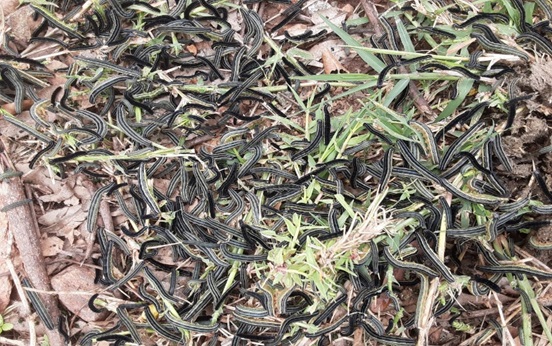
Kotido, Uganda | THE INDEPENDENT | The outbreak of the fall armyworms and drought has dashed the hopes of farmers in the Karamoja region to get out of the biting hunger. The parasites have destroyed several acres of maize, millet and sorghum gardens in the nine districts of Karamoja sub region.
Some of the farmers visited by URN described the continuous suffering that the people of Karamoja are going through as a curse. Mark Lodumoi, a father of four children and a resident of Kacheri village in Kacheri sub-county in Kotido district, says that he cultivated five hectares of maize mixed with beans, which were destroyed by the armyworms and drought.
“I don’t know why all this harsh condition is for us the Karimojong. We have tried to repent to God to forgive us for the crimes that we used to commit because we realized that God may be not happy with us the Karimojong but still things have continued getting worse,” he said.
Betty Angolere, another farmer and a resident of Musasi village in Loputuk sub-county, says that the situation has been made worse with the disappearance of rains since April this year. This is the first time for the region to face the fall armywarm apart from the usual shortage of food caused by total crop failure as a result of drought.
Karamoja region received some rains in April that prompted hundreds of people to open gardens while in some areas crops had already started flowering. However, the region has not had rains since April 12, 2022, to date in Moroto, Amudat, Kotido and Kaabong districts. The only area that has continued receiving little rain after two weeks is Namalu in Nakapiripirit district.
Christine Angolere, another farmer from Rupa sub county in Moroto district regretted why she sold her goats to hire tractors to open her gardens. “I had seven goats and I sold six of them to hire a tractor to open for me eight hectors where I planted maize and beans. This time around I had hope of stocking enough food for my children but am seeing the way my crops are drying after being attacked by fall armyworms and scorching sunshine indicates danger ahead,” she said.
Tengei Mario, a retired Moroto District Agricultural Officer, says that the attack on crops by fall armyworms and the little rains in the region have created another big gap in their efforts to address the problem of hunger. He says the scorching sun has affected their efforts to fight the fall armyworms.
Paul Lokol, the LCV chairperson of Nabilatuk district, says that the war has destroyed about 700 acres of crops in the district. “We are not safe next year again because what our people had planted has been affected by armywarm and little rainfall,” he said.
*****
URN
 The Independent Uganda: You get the Truth we Pay the Price
The Independent Uganda: You get the Truth we Pay the Price



